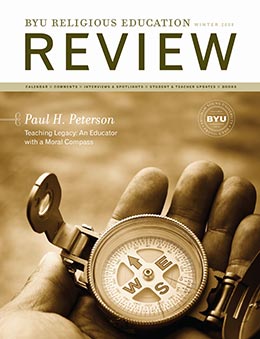A Conversation with J. Spencer Fluhman
Christopher C. Jones and J. Spencer Fluhman
J. Spencer Fluhman (fluhman@byu.edu) was an assistant professor of Church history and doctrine at BYU.
Christopher C. Jones (chrisjones13@gmail.com) was a master’s student of history at BYU.
Q&A with J. Spencer Fluhman
Interview by Christopher C. Jones
J. Spencer Fluhman (fluhman@byu.edu) is an assistant professor of Church history and doctrine at BYU.
Christopher C. Jones (chrisjones13@gmail.com) is a master’s student of history at BYU.
After graduating summa cum laude from BYU in 1998 with a degree in Near Eastern studies, Fluhman obtained an MA (2000) and PhD (2006) from the University of Wisconsin–Madison in history. Fluhman was recently selected to participate in the Young Scholars in American Religion program at the Center for the Study of Religion and American Culture at Indiana University–Purdue University at Indianapolis.
Q: Congratulations on your recent selection to the Young Scholar program. Can you tell us a bit about the program?
A: The program had its beginnings in the early nineties. The Center for the Study of Religion and American Culture, with funding from the Lily Endowment, established the program to support young university faculty working in the field of American religion. Every few years, ten to twelve young scholars meet in Indianapolis for seminars aimed at enhancing their research and writing, classroom teaching, and professional development. Over the course of their appointments, seminar participants are expected to write a publishable piece of research. Some of those articles are published in the center’s journal, Religion and American Culture. I will be a seminar member at the center from 2007 to 2009.
Q: How were you selected? Did you have to apply?
A: The center accepts applications in a national competition before each seminar series. Applicants submit vitae, essays describing their scholarly work and teaching, and letters of recommendation.
Q: What will your responsibilities and schedule include in this program?
A: I will attend five seminars, held in October and April, over the next couple of years. The seminars alternate between teaching, research, and professional development emphases.
Q: Do you feel like it is an important achievement for a historian of Mormonism to be recognized and selected for this program?
A: I think it is another signal that Latter-day Saint Church history is increasingly being seen as an important part of the larger story of American religious history. With as rich history and documentary archive as we have, non–Latter-day Saint scholars are drawn to the field in greater numbers these days, too. It is an exciting time to be working in the field.
Q: What current research are you working on?
A: I am expanding the study I began in graduate school, which surveys American perceptions of early Latter-day Saints. I have tried to use those perceptions as a window into how Americans came to grips with the religious and cultural changes of the nineteenth century. I have found that we have a great deal to learn about how and why people perceived Joseph Smith and the Church the way they did. When it is done, I hope to have assembled a history of “Mormonism in the American mind” from 1830 to 1896.
Q: What is the current state of Mormon studies? What do you see in its future?
A: I am excited about Mormon studies. Interdisciplinary interest in the Church, its people, and our past is a sign of a certain maturity with regard both to the Church and to the academy. One of the most exciting things about this surge in interest is the ways it brings people from within and outside the Latter-day Saint tradition together in a search for understanding. It forces those of us on the inside to be clearer about ourselves, and, on the other hand, it forces those on the outside to replace old stereotypes with more nuanced and compelling understandings of us. In my mind, it is a win-win scenario.
Q: What advice do you have for young Latter-day Saint students of Mormon history who aspire to follow in your footsteps and pursue Mormon studies professionally?
A: The first thought I have is simply to echo what Latter-day Saint scholar Richard Bushman recently wrote. I agree with him that it would be a mistake for Latter-day Saint scholars to check their beliefs at the door when they write. I see no compelling reason for a believing scholar to obscure his or her faith in any way. Second, it will serve any young scholar well to work toward mastering the wider field and historical context. A valid criticism of past Latter-day Saint histories is that too few are accessible to folks outside the tradition. Translating our history for non–Latter-day Saint readers is hard work, to say the least, but it is work that must be done if we hope to do justice to the real significance of the story. I guess I am restating what has been said by President Spencer W. Kimball, Elder Neal A. Maxwell, and others through the years: Latter-day Saint scholarship of lasting significance will issue from those who are, in effect, bilingual, possessing both a vocabulary of faith and one that works in the modern academy. So, there is your answer (finally!): be the best Latter-day Saint you can be, and squeeze every drop of insight you can from the wider historical field.
